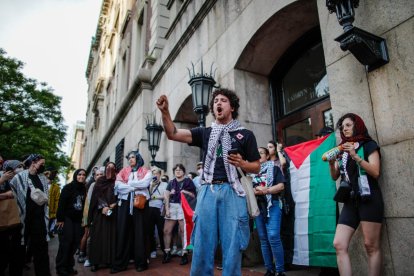Antisemitism: House of Representatives reveals how university authorities failed to protect Jewish students
A report submitted by the House Education Committee indicated that there was a hostile environment towards Jewish students on campuses, which authorities chose to ignore.

Pro-Hamas protest at Columbia University.
The U.S. House Education Committee released a report in which it revealed the country's top universities' failure regarding the handling of antisemitism demonstrations on campus.
In its report, the committee presented a series of discussions on the issue that took place among the administrations of the various academic institutions.
The report, which is more than 300 pages long and is based on subpoenas of witnesses, document requests and transcribed testimony, indicated that there was a hostile environment toward Jewish students, which is a violation of the Civil Rights Act.
Harvard University
According to the report, two days after the October 7 massacre, administrators at Harvard University had issued a statement condemning the terrorist group Hamas and expressing solidarity with the hostages. However, these key elements of the statement were watered down or removed at the request of the institution's then-president Claudine Gay and by Alan Gerber, who holds that position today and was the dean at the time.
The report stressed that due to the request of both leaders, key portions of the statement were removed, including mention of the hostages.
According to internal messages submitted to the committee, the Harvard administration preferred not to issue a harsher statement against Hamas, citing the issue as "complex" and "deeply divisive."
In fact, George Q. Daley, dean of the Medical School, asked not to use the term violent to qualify the brutal October 7 attack as it "sounded like assigning blame when it's best we express horror at the carnage that is unfolding," referring to the counter-offensive by Israeli forces against Hamas and other terrorist groups in the Gaza Strip.
Gay and Gerber agreed to remove the word violent, and the then dean expressed concern that Daley would issue his own commentary establishing a moral equivalence between Israel and Hamas should he object to doing so.
In addition, John Manning, the university's current chancellor, also objected to including a portion in the statement that referred to the impact of the kidnappings on the Harvard community. In fact, a mention of members of the university who had lost family and friends on October 7 was removed from the original draft.
The reason given by Manning and some faculty at the institution was that the hostages could not be mentioned without a reference to Palestinian suffering.
In a transcribed interview with the committee last August, Penny Pritzker, a senior fellow at the Harvard Corporation, called the university administration's statement "massively inappropriate at the time and insufficient."
In addition, the committee's report stated that Pritzker asserted to Gay that a sign reading 'From the River to the Sea, Palestine Will Be Free' constituted a clearly antisemitic message since it is a phrase that calls for the annihilation of the Jewish state and Jews in general, which is why he asked the then Harvard president to condemn it.
Gay, however, urged Pritzker to avoid stating that it was an antisemitic expression in front of students, as many would wonder what the authorities are doing about it.
Gerber argued that it is not such a "simple" matter and that there is no consensus that the phrase always has an antisemitic connotation.
The report also noted that students who caused disturbances or disrupted classes did not receive any punishment, but only minor sanctions, some of which were even revoked.
Pritzker said in her testimony before the committee that the Harvard Corporation viewed the uneven application of sanctions by administrative boards as a problem to which a solution had not yet been found, but that administrators recognized that the issue needed to be addressed.
Columbia University
Regarding Columbia University, the report indicated that Minouche Shafik, then president of the institution, contacted Democrat Chuck Schumer, Senate majority leader, who told her that the political problem with the universities is really only among Republicans. He also suggested she keep a low profile and avoid meeting with Republicans.
Angelo Roefaro, Schumer's spokesman, denied the report's claims and assured that the Democratic senator, who is Jewish, regularly condemned antisemitic acts at Columbia and other universities.
In addition, David Greenwald, the current chairman of the institution's board of trustees, and Jonathan Lavine, his predecessor, wrote in private messages that they hoped for a Democratic victory in the House to stop the investigations against the universities.
In another internal message, Claire Shipman, chair of Columbia's board of trustees called congressional criticism of antisemitism on campus "nonsense" and pushed for sanctions to be lifted for pro-Hamas organizations.
The report also took aim at the way Columbia authorities handled the anti-Israel encampment and the occupation of Hamilton Hall. It added that most of the 22 students arrested for this event were allowed to graduate or remain in good standing. Only one received probation and three were suspended. None were expelled.
The lax sanctions were not limited to just those who occupied Hamilton Hall. In fact, one student who declared that "Zionists don't deserve to live" received only probation, while two other students who organized an event at which members of terrorist groups spoke got the same punishment and the remaining three received only warnings.
In addition, the report revealed that a senior leader of the University Senate actively supported pro-Hamas protesters and silenced Jewish and pro-Israel voices in the Senate.
While the university did not reach an agreement with the pro-terrorist rioters, internal documents indicated that some concessions were considered, such as divestment from Israeli companies and the cessation of relations with them or those doing business with Israel; the creation of a joint program with West Bank university; the provision of scholarships to Palestinians; the granting of amnesty or the implementation of lenient judicial procedures to those involved in pro-Hamas protests; and the reactivation of anti-Israel student organizations.
The report also showed that the punishments imposed on pro-Hamas rioters and pro-Israel activists were not balanced, and in fact were absolutely unfair to the latter.
In this regard, mention was made of an incident in which Jewish students sprayed a spray with a foul-smelling odor at the site where a pro-Hamas demonstration was taking place. The students involved in the event were suspended for a year and a half, a longer period than that applied to any student punished for anti-Semitic acts.
Columbia claimed at the time that it was an illegal chemical, but it was later found to be legal and available in stores. And following a lawsuit filed by one of the Jewish students, the university was forced to reduce the suspension, issue a public statement and pay nearly $400,000 in compensation.
The report also took aim at Shafik's indifference to complaints of discrimination and harassment in the institution's joint degree program with Tel Aviv University. According to the report, she even tried to minimize this collaboration, and a post about the graduation ceremony of the program's first class was removed from Columbia's social media.
University of Pennsylvania
As for the University of Pennsylvania (UPenn), Scott Bok, chairman of the institution's board of trustees, wrote to President Liz Magill that she should not take the pressure and criticism about the institution's handling of antisemitism seriously, as it came from politicians and critics who are "easily purchased."
In addition, the report stated that the institution's leadership coordinated in advance with a local media outlet to provide favorable coverage of former President Magill's testimony before Congress and called the legislators' questions "bullying and grandstanding."
At UPenn, only three students have been suspended, for one semester each, and 14 were placed on probation, despite serious incidents that included theft, an encampment resulting in 21 arrests, a home invasion of the university president's house, and other disruptions of campus activities.
Northwestern University
The report also revealed that Nour Kteily, a senior lecturer at Northwestern University, told a colleague that he hoped to achieve "amazing wins" for the protesters as part of a negotiation he was leading on their behalf.
The professor was part of the administration's negotiating team with the pro-Hamas camp on campus, and was even a member of the antisemitism task force created specifically after the protests, although he publicly opposed the proposal to form it. As part of negotiations with the protesters, he suggested boycotting products from the Israeli food company Strauss on campus.
University of California, Los Angeles
Regarding the University of California, Los Angeles (UCLA), the report stated that university police were asked not to act when pro-Hamas protesters set up an encampment. And it added that despite the administration being aware of a number of violations of the institution's regulations, it failed to intervene, and even sent misleading or inaccurate messages to the campus community about the encampment.
The report remarked that 96 students were detained, 92 of whom were not punished after signing resolution agreements.
Authorities maintained that they were unable to identify anyone who prevented Jewish students from accessing certain parts of the campus.
Rutgers University
At Rutgers University, the report described a student, who incited others to kill an Israeli student, was allowed to remain on campus during the disciplinary process against him, and was ultimately suspended for only one semester. In contrast, many Jewish students were sanctioned only for expressing their opinions about antisemitism on campus.
University of California, Berkeley
At the University of California, Berkeley, only one student has received probation and two others are in the midst of disciplinary proceedings, despite anti-Semitic activity at the university, which included an encampment, occupation of a building, and disruption of an event that resulted in a group of students being forced to evacuate under police protection.
Yale University
Yale University has only placed two students on probation, one for inciting violence and another after being arrested at the pro-Hamas encampment.
RECOMMENDATION






















